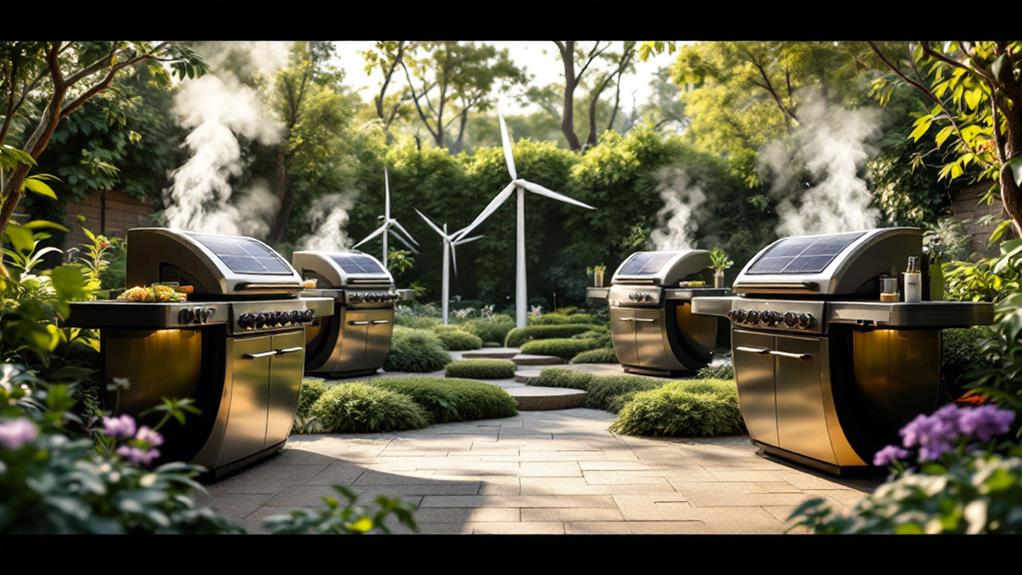
Review: The Most Sustainable Grills for Green Outdoor Cooking
For those committed to eco-friendly outdoor cooking, sustainable grills are an excellent choice. Options like Casus Grill, which is biodegradable, cut CO2 emissions considerably. Gas and electric grills are more energy-efficient, with electric models benefiting greatly from renewable energy sources. Pellet grills offer a renewable alternative with exceptional flavor, while solar grills promise zero-emission cooking. Opting for natural and sustainably sourced charcoal further reduces environmental impact. Prioritizing proper grill maintenance and choosing eco-conscious accessories also enhances sustainability. If you're enthusiastic to explore the myriad ways to green your grilling experience, your journey continues here.
Key Takeaways
- Electric grills use renewable grid energy, reducing pollution and supporting sustainable cooking.
- Pellet grills offer renewable cooking with compressed wood pellets, providing excellent flavor with lower emissions.
- Gas grills are energy-efficient and lower carbon output, making them more eco-friendly than charcoal.
- Solar grills harness sunlight for zero-emission cooking, promoting green outdoor cooking practices.
- Composting food scraps and recycling packaging materials significantly reduce waste and environmental impact.
Eco-Friendly Grilling Practices
Embracing eco-friendly grilling practices is vital for minimizing the environmental impact of outdoor cooking. One important aspect is grill maintenance, which guarantees that equipment operates efficiently, reducing unnecessary emissions. Regular cleaning and inspection of grills can prevent blockages and inefficiencies that might lead to excess fuel consumption.
Sustainable sourcing of materials is another key practice. Opting for natural, additive-free charcoal over traditional options helps decrease pollution associated with harmful binders and lighter fluids. In addition, using gas grills, which are inherently more energy-efficient, can greatly reduce pollutant emissions compared to charcoal grills.
To further enhance eco-friendly grilling, consider avoiding petroleum-based lighter fluids. Instead, use charcoal chimneys or electric starters to cut down on harmful emissions. Using grill lids efficiently retains heat, increasing energy efficiency and lowering fuel consumption. This practice not only fosters a sustainable grilling experience but also contributes to a more enjoyable cooking process.
Lastly, waste reduction through composting food scraps and recycling packaging materials is indispensable. By integrating these simple yet effective methods, outdoor cooking enthusiasts can greatly mitigate their environmental footprint and champion a greener, more sustainable lifestyle.
Top Sustainable Grill Models
In the domain of outdoor cooking, selecting a grill model that aligns with environmental sustainability is essential for reducing ecological impact. Among the top sustainable grill models, the Casus Grill stands out as a single-use biodegradable grill crafted from 100% natural materials, offering an innovative solution that cuts CO2 emissions by up to 50% compared to traditional grills. This model exemplifies how biodegradable grills can contribute to eco-friendly cooking.
Electric grills provide another sustainable option, leveraging grid energy that can be derived from renewable resources such as solar or wind power, making them among the least polluting choices. Similarly, Pellet grills, which utilize compressed wood pellets, offer a renewable and sustainable cooking method, delivering excellent flavor and versatility.
Gas grills present a cleaner alternative to charcoal, with natural gas being the most environmentally considerate fossil fuel available, reducing carbon output. Additionally, the Lotus Grill is a portable charcoal BBQ that employs a smokeless design, enhancing cooking efficiency while minimizing ecological impact.
| Grill Model | Key Feature |
|---|---|
| Casus Grill | Biodegradable, 50% less CO2 emissions |
| Electric Grills | Powered by renewable resources |
| Pellet Grills | Use renewable wood pellets |
| Lotus Grill | Smokeless, efficient charcoal cooking |
These models illustrate how conscious choices in grill selection can advance sustainable outdoor cooking.
Choosing the Right Charcoal
Selecting the right charcoal can greatly impact both the environment and the quality of your outdoor cooking experience. Opting for natural, additive-free charcoal types is an essential step in emission reduction, as these options markedly minimize harmful emissions and volatile organic compounds (VOCs). The absence of binders and lighter fluids in these charcoals guarantees a cleaner burn, resulting in a healthier grilling environment and a more authentic flavor profile for your food.
Sustainability considerations should also guide your choice of charcoal. Preferably, select charcoal made from sustainably harvested wood. This practice not only reduces deforestation but also guarantees that the carbon released during burning equates to the carbon naturally emitted from decaying wood. Such practices help in maintaining a balance in the carbon cycle, vital for mitigating climate change.
Furthermore, cleaner charcoal contributes to a considerable reduction in pollution, promoting an eco-friendly barbecue experience. By consciously choosing the right charcoal type, you not only support emission reduction but also enhance the taste of your grilled dishes.
This approach aligns with a broader commitment to sustainable living, proving that small choices in grilling can lead to notable environmental benefits.
Efficient Lighting Techniques
Shifting to sustainable outdoor cooking necessitates reevaluating traditional lighting methods to mitigate environmental impact and enhance safety.
By adopting alternative lighting techniques such as charcoal chimneys and electric starters, grill enthusiasts can markedly reduce the emission of volatile organic compounds associated with lighter fluids.
Furthermore, incorporating natural ignition agents like fatwood not only supports eco-friendly practices but also improves the taste quality of grilled foods by avoiding smoke-related chemical interference.
Alternative Lighting Methods
Embracing alternative lighting methods for outdoor cooking presents a multitude of benefits for both the environment and personal safety. Avoiding lighter fluids, which release over 14,000 tons of volatile organic compounds annually, is a critical step towards eco-friendly grilling. Instead, employing alternative ignition methods such as charcoal chimneys and electric starters can notably reduce environmental impact. These techniques are not only eco-friendly starters, but they also enhance safety by eliminating the need for hazardous self-lighting briquettes.
| Method | Benefits | Environmental Impact |
|---|---|---|
| Charcoal Chimneys | Safe, efficient ignition | Reduces VOC emissions |
| Electric Starters | No chemicals, reusable | Minimizes pollution |
| Natural Fatwood | Chemical-free, sustainable | Lowers pollution levels |
| Reusable Fire Lighters | Cost-effective, durable | Reduces waste |
| Solar Ignition Kits | Renewable energy source | Zero emissions |
Reducing Lighter Fluid
Frequently overlooked, the reduction of lighter fluid use in outdoor cooking is a pivotal step towards sustainable grilling. Lighter fluids contribute over 14,000 tons of volatile organic compounds (VOCs) annually, underscoring the need for eco-conscious alternatives that reduce environmental impact and enhance safety.
By employing efficient lighting techniques, grill enthusiasts can embrace a more sustainable approach that aligns with eco-friendly initiatives. Here are key methods to contemplate:
- Alternative Charcoal Options: Opt for natural charcoal products that do not require lighter fluids. These alternatives are often made from renewable resources and produce fewer emissions.
- Eco Friendly Igniters: Use eco-friendly igniters such as charcoal chimneys or electric starters. These methods eliminate the need for lighter fluids, thereby reducing VOC emissions and decreasing the risk of injuries.
- Natural Lighting Methods: Incorporate fatwood or other natural fire starters, which are devoid of chemical additives and offer a clean, efficient ignition.
- Enhanced Grilling Experience: By adopting these sustainable techniques, the overall grilling experience is improved, fostering a healthier environment and promoting responsible outdoor cooking practices.
Through these measures, reducing lighter fluid use not only mitigates pollution but also contributes to a safer and more enjoyable grilling experience.
Safe Ignition Practices
Implementing safe ignition practices is an essential step towards reducing environmental impact and enhancing the safety of outdoor cooking. Traditional methods, such as using lighter fluids, release over 14,000 tons of volatile organic compounds (VOCs) into the atmosphere each year. This not only contributes to air pollution but also poses significant risks of injury.
As advocates for a healthier planet, we must embrace efficient lighting techniques that prioritize ignition safety and sustainability.
Opting for charcoal chimneys or electric starters over lighter fluids is a practical solution. Charcoal chimneys, in particular, offer a clean and efficient ignition method, minimizing harmful emissions and offering a more eco-friendly grilling experience. These devices work by allowing airflow to ignite the charcoal naturally, eliminating the need for chemical agents.
Furthermore, natural alternatives like fatwood provide a safer method for lighting grills. Unlike self-lighting charcoal, which can be equally detrimental, fatwood is a non-toxic, renewable resource that lights easily and burns cleanly.
Grill Durability Insights

When considering the sustainability of outdoor cooking, many recognize the critical role that grill durability plays in reducing environmental impact. Utilizing high-quality materials like stainless steel or cast iron not only enhances grill material durability but also offers resistance to corrosion, guaranteeing a longer life cycle for the grill.
This longevity means fewer replacements, thereby lessening the environmental burden associated with manufacturing, shipping, and disposal. To maximize these benefits, consider these maintenance tips:
- Regular Cleaning: Confirm grills are cleaned after each use to prevent buildup and corrosion. Regular maintenance helps maintain grill integrity and performance.
- Protective Covers: Invest in a durable cover to shield your grill from weather elements. This prevents rust and extends the lifespan of your equipment.
- Component Inspections: Routinely check parts like burners and grates for wear and tear. Early detection of issues can prevent costly replacements and waste.
- Efficient Charcoal Use: For charcoal grills, utilize shut-off mechanisms to save unused charcoal, minimizing waste.
Environmental Benefits of Grilling
Outdoor cooking offers a multifaceted approach to environmental sustainability, presenting notable benefits that extend beyond simple culinary enjoyment. One of the primary grilling benefits is the reduction in packaging waste, as it encourages the use of fresh, unprocessed food. This shift away from pre-packaged meals not only cuts down on waste but also fosters healthier eating habits.
Additionally, outdoor cooking allows households to decrease their dependence on electricity, as grilling requires minimal or no power from traditional energy sources, thereby helping to reduce emissions from power plants.
High-efficiency gas or electric grills further enhance these environmental benefits by minimizing air pollutants and greenhouse gas emissions. Unlike traditional charcoal grills, which are notorious for their pollution, these modern alternatives offer cleaner combustion.
However, for those who prefer the classic taste of charcoal, using natural, additive-free charcoal can reduce harmful smoke chemicals, marrying flavor with eco-consciousness.
Grilling also supports local economies and reduces carbon footprints by promoting the use of locally sourced, organic ingredients. This not only enhances the freshness and nutritional value of meals but also considerably cuts down on emissions associated with long-distance food transportation, making outdoor cooking a holistic approach to sustainability.
Innovative Grill Technologies

As the environmental benefits of grilling become increasingly appreciated, attention turns to innovative grill technologies that further improve sustainable outdoor cooking practices. These technologies not only reduce emissions but also offer unique advantages that align with eco-friendly objectives.
- Electric Grill Innovations: Electric grills are gaining popularity due to their ability to produce fewer emissions compared to traditional charcoal or gas options. This leads to a cleaner, more sustainable cooking experience without sacrificing the quality of grilled dishes.
- Pellet Grill Benefits: Utilizing compressed wood pellets as a renewable fuel source, pellet grills notably minimize environmental impact. In addition to being sustainable, they enhance the flavor profile of grilled foods, making them a favored choice for eco-conscious chefs.
- Solar Grills: By harnessing sunlight, solar grills achieve zero-emission cooking. This innovative technology not only promotes sustainable energy use but also sets a precedent for future grilling practices with minimal carbon footprint.
- Advanced Charcoal Grills: Designed with efficient ash management and temperature control, these grills guarantee ideal fuel utilization. By reducing pollution and maximizing efficiency, they represent a considerable step forward in eco-friendly grilling.
Each of these innovations demonstrates a commitment to reducing environmental impact while maintaining the joy and flavor of outdoor cooking.
Sustainable Fuel Options
Shifting to sustainable fuel options for outdoor grilling is pivotal in reducing environmental impact while enjoying flavorful meals. Natural gas stands out as the cleanest fossil fuel choice, offering lower emissions compared to traditional charcoal or propane, thereby promoting emissions reduction.
However, the shift towards more renewable options is gaining momentum. Wood pellets, crafted from waste materials, present a renewable and eco-friendly alternative. Their use supports sustainable sourcing, minimizing reliance on new timber and reducing landfill waste.
Charcoal alternatives, made from sustainably harvested wood, further enhance the eco-friendliness of grilling. These options considerably cut down on harmful smoke chemicals, enriching food flavor while lessening environmental harm.
Biogas options, derived from organic waste, provide a sustainable grilling method that contributes to lowering carbon footprints.
Electric grills, when powered by renewable energy sources such as solar or wind, offer another path to reduced emissions. These grills utilize eco-friendly materials and can be more efficient than conventional gas or charcoal grills.
Embracing these sustainable fuel options not only supports a greener planet but also raises the outdoor cooking experience with less environmental compromise. By prioritizing these choices, grill enthusiasts can contribute to a more sustainable future.
Energy-Saving Cooking Methods

Incorporating sustainable fuel options into grilling practices is a commendable step toward environmental stewardship, yet optimizing cooking methods is equally important for achieving energy efficiency.
Employing energy-saving grilling techniques can markedly reduce the ecological footprint of outdoor cooking. By understanding and applying efficient energy optimization strategies, grill enthusiasts can enjoy eco-friendly culinary experiences.
Here are four effective methods to enhance energy efficiency while grilling:
- Direct Grilling: This technique reduces cooking time and energy usage by exposing food to direct heat, thereby lowering fuel consumption markedly.
- Using a Grill Lid: Keeping the grill lid closed retains heat, which improves cooking efficiency. This method minimizes energy use by maintaining consistent temperatures.
- Indirect Grilling: Opt for lower cooking temperatures with indirect grilling. This method saves fuel compared to high-temperature grilling techniques, making it a sustainable choice.
- Preheating and Batch Cooking: Preheat the grill for shorter durations, especially with gas grills that heat up in 5-10 minutes.
Additionally, batch cooking maximizes energy use by preparing multiple meals simultaneously, reducing the need for additional cooking sessions.
Eco-Conscious Accessories
Integrating eco-conscious accessories into outdoor cooking routines is an essential step towards reducing environmental impact. Biodegradable accessories, such as grill mats, offer a sustainable solution, replacing traditional non-stick surfaces with compostable options that reduce plastic waste. These mats simplify cleanup and can return to the earth after their lifecycle, embodying the principles of a circular economy.
Incorporating reusable tools like grill brushes guarantees a reduction in single-use products, which directly translates to less landfill waste. These brushes are designed for durability and sustainability, offering an eco-friendly means to maintain grills without the need for constant replacements.
Compostable utensils and plates made from palm leaf or sugarcane bagasse further mitigate the reliance on single-use plastics, promoting an almost zero-waste dining experience during outdoor gatherings.
Solar-powered lights are another innovative accessory that enriches the grilling experience while minimizing carbon footprints. By harnessing the sun's energy, these lights eliminate the need to draw electricity from the grid.
Reducing Grilling Waste

Addressing waste reduction in outdoor grilling is essential for promoting sustainability and environmental stewardship.
Composting food scraps not only diverts organic waste from landfills but also enriches soil health, creating a beneficial cycle for future food production.
Additionally, recycling grill materials at the end of their lifecycle can notably lower the demand for new resources and reduce the carbon footprint associated with manufacturing and disposal.
Compost Food Scraps
Despite the convenience of tossing food scraps into the trash, composting them offers a more sustainable solution to grilling waste. Embracing the compost benefits of recycling kitchen scraps can greatly decrease the environmental impact of your outdoor cooking activities.
Organic materials comprise approximately 30% of the waste stream in the U.S. annually. By diverting these kitchen scraps to a compost bin, we can transform waste into valuable soil nutrients, greatly reducing our reliance on chemical fertilizers and enhancing plant growth.
Consider these compelling reasons to start composting your grilling leftovers:
- Landfill Waste Reduction: Composting can greatly decrease landfill waste by converting organic matter into nutrient-rich compost, reducing the need for landfill space.
- Greenhouse Gas Mitigation: By composting the estimated 60 million tons of food waste annually, we can prevent the release of methane, a potent greenhouse gas, from landfills.
- Household Waste Minimization: Implementing a composting system can reduce household waste by 20-50%, promoting a more sustainable lifestyle.
- Soil Enrichment: Compost enriches soil, enhances water retention, and reduces the need for additional watering during dry spells.
Incorporating composting into your grilling routine not only minimizes waste but actively contributes to a healthier planet.
Recycle Grill Materials
While composting food scraps greatly reduces the environmental impact of grilling, addressing the waste generated by the grills themselves is equally important. Focusing on recyclable materials and sustainable design in grills can greatly decrease the environmental footprint.
Many charcoal grills are constructed using recyclable materials, such as stainless steel or aluminum, which not only enhance durability but also guarantee that these metals can be easily recycled at the end of their lifecycle. This choice reduces the burden on landfills and promotes a circular economy approach in grilling practices.
Incorporating sustainable design extends to the fuel used as well. Opting for charcoal made from reclaimed wood or by-products further minimizes environmental impact. Such choices exemplify an eco-conscious approach that prioritizes resource conservation and waste reduction.
Moreover, regular maintenance of grills plays a critical role in prolonging their functionality, thereby diminishing the frequency of replacements and the waste from discarded units.
Additionally, recycling packaging materials from grill supplies, such as cardboard and plastic, aids in resource conservation. By committing to these practices, grill enthusiasts can greatly contribute to a more sustainable and responsible outdoor cooking experience.
Frequently Asked Questions
What Is the Most Environmentally Friendly Outdoor Grill?
Solar grills are the most environmentally friendly outdoor option, offering zero emissions through the use of sunlight. Portable options enhance their appeal, providing sustainable, eco-conscious cooking solutions that align with green living and renewable energy advocacy.
What Is the Best Environmentally Friendly BBQ?
The best environmentally friendly BBQ combines electric options with sustainable grill materials, minimizing emissions and resource consumption. Prioritizing grills utilizing renewable energy and eco-conscious designs supports environmental preservation, aligning with sustainability goals for responsible outdoor cooking practices.
What Type of Grill Is the Healthiest?
Electric grills are considered the healthiest option due to their reduced emissions and absence of open flames. Utilizing grill materials like sustainably sourced charcoal enhances health benefits by minimizing chemical exposure and promoting cleaner cooking practices.
Which Is Better for the Environment, Charcoal or Gas Grill?
Gas grills are more environmentally friendly due to their higher efficiency and lower carbon emissions compared to charcoal grills. Charcoal emissions greatly contribute to air pollution, whereas gas efficiency helps reduce overall greenhouse gas output, promoting sustainable grilling practices.
Conclusion
The adoption of sustainable grilling practices greatly mitigates environmental impact, promoting eco-friendly outdoor cooking. Selection of top sustainable grill models, coupled with the use of environmentally conscious charcoal and lighting methods, enhances energy efficiency. Emphasizing grill durability and sustainable fuel options further supports conservation efforts. Incorporating energy-saving cooking techniques and eco-conscious accessories contributes to reduced waste. Through these measures, grilling can be transformed into an activity that aligns with ecological advocacy and responsible stewardship of natural resources.



Leave a Reply